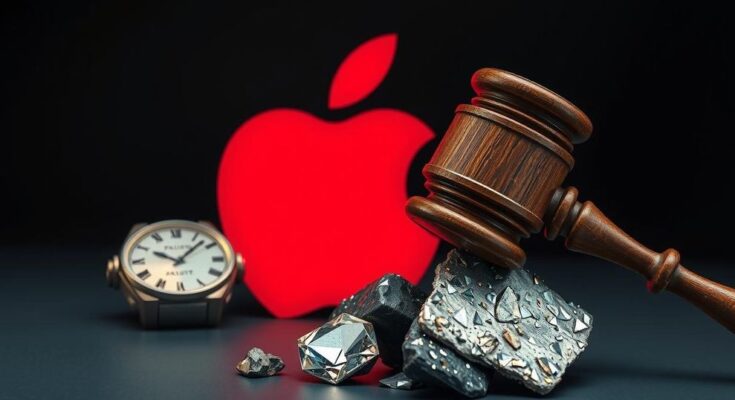The DRC has filed a lawsuit against Apple, alleging the company’s use of illegally sourced minerals from conflict zones controlled by armed groups. The case highlights severe human rights abuses associated with the mining industry in the DRC. While Apple denies these claims and emphasizes its commitment to ethical sourcing, skepticism remains among NGOs and local activists regarding its supply chain management.
The Democratic Republic of Congo (DRC) has instituted a legal action against Apple, alleging that the technology giant has been utilizing minerals obtained from illegal mining operations within the DRC. The complaint, lodged recently, centers on the so-called 3T minerals—tin, tantalum, tungsten—and gold. Reports by UN officials indicate that many of these mines are controlled by armed factions implicated in severe human rights abuses, including violence and exploitation against local communities.
The lawsuit also accuses Apple’s subsidiaries in France and Belgium of facilitating the smuggling of Congolese minerals through Rwanda. Specifically, the legal team representing the DRC’s Justice Ministry contends that Apple has engaged in misleading business practices, falsely assuring consumers that its supply chains are ethically sourced. Attorney Christophe Marchand, who has played a crucial role in the case, emphasizes that the intention is to enlighten consumers regarding the conditions under which their products are made.
Apple has firmly rejected these allegations, asserting that it enforces high standards among its suppliers and has proactively restricted the sourcing of minerals from the DRC and Rwanda due to concerns about the veracity of industry certifications. The company maintains that its supply chain does not support armed conflict in the region. While Apple proclaims significant progress in using recycled materials, skepticism persists among NGOs and local activists about the effectiveness of its oversight mechanisms.
Local stakeholders express cautious optimism regarding the lawsuit’s potential to expose the detrimental trade of conflict minerals. Activists, including Hypocrate Marume and Emmanuel Umpula, highlight the complicity of various entities in the illegal extraction of resources. The court’s rulings in France and Belgium may set a critical standard for holding multinational corporations accountable regarding their resource procurement practices.
The issue of conflict minerals has long been a contentious topic, particularly in regions like the DRC, where illegal mining operations are frequently linked to armed groups. These groups often exploit local populations, resulting in severe human rights abuses. The international community, including the United Nations, has been increasingly concerned about the sourcing of minerals from such conflict zones, leading to calls for greater transparency and accountability within supply chains of major corporations, particularly in the tech industry, which relies heavily on these minerals. Legal actions taken by the DRC against prominent corporations such as Apple underscore the urgency and seriousness of the issue as affected communities seek justice and reparations.
In conclusion, the DRC’s lawsuit against Apple poses significant questions regarding the ethical sourcing of minerals and the responsibilities of multinational corporations towards local communities in conflict zones. The implications of this case could influence corporate practices and consumer awareness surrounding conflict minerals. As the legal proceedings unfold, the outcome may also establish a precedent for corporate accountability, particularly in industries that rely on natural resources from regions affected by violence and exploitation.
Original Source: eastleighvoice.co.ke




